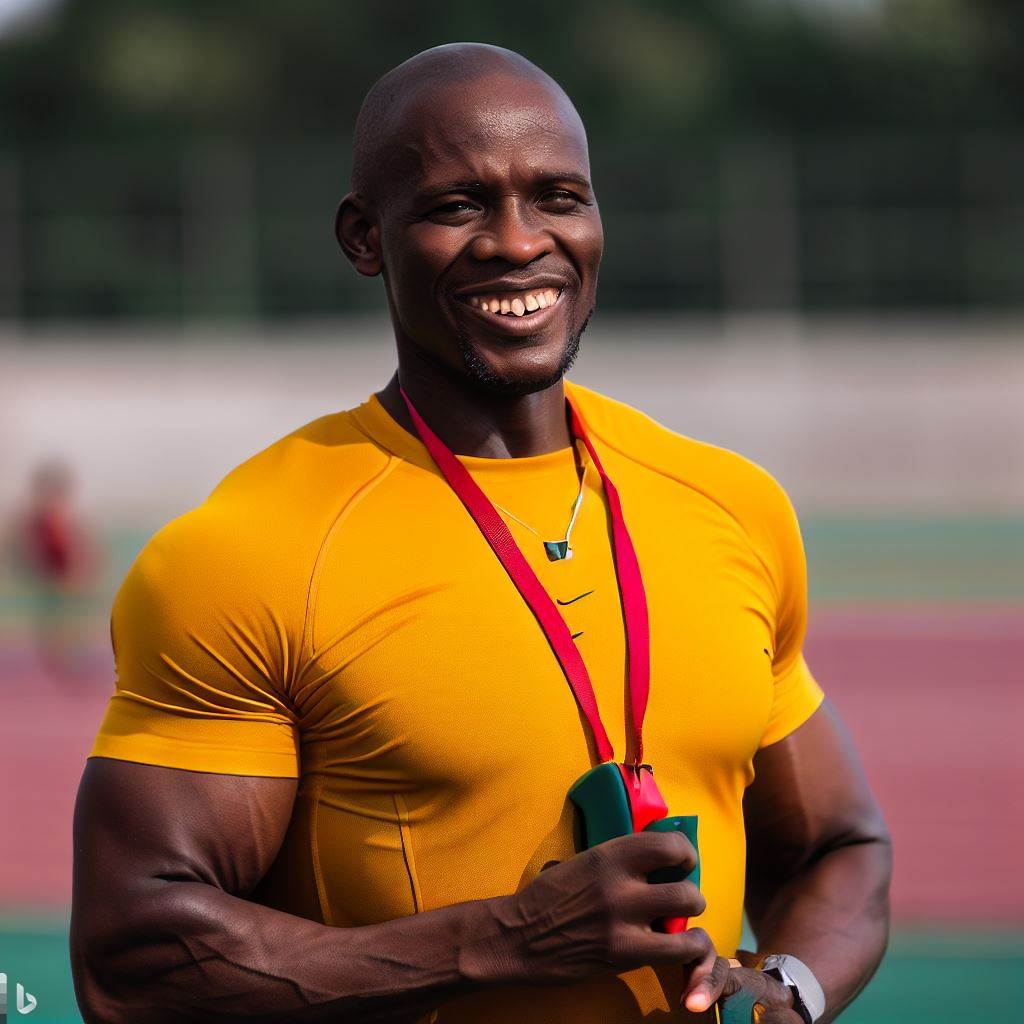Introduction
Becoming a PE teacher in Nigeria requires proper education and licensing, which are vital in this field.
A PE teacher plays a crucial role in promoting physical fitness and overall well-being among students.
By following the necessary educational requirements and obtaining the proper licensing, individuals can develop the skills and knowledge needed to succeed in this profession.
Education is of utmost importance for aspiring PE teachers in Nigeria.
Through formal education, individuals acquire the necessary theoretical knowledge and practical skills to effectively teach physical education.
Pursuing a degree in sports science, physical education, or a related field provides a solid foundation for a career in PE teaching.
Education equips future PE teachers with the necessary expertise to design and implement proper fitness programs, assess students’ physical abilities, and create a supportive learning environment.
Obtaining licensing is another crucial step for individuals aspiring to become PE teachers in Nigeria.
Licensing ensures that teachers possess the necessary qualifications and adhere to professional standards.
It also guarantees that students receive quality physical education instruction.
The licensing process typically involves meeting certain educational requirements, passing examinations, and sometimes completing a teaching practicum.
Additionally, ongoing professional development is essential to maintain and renew the teaching license, ensuring that PE teachers stay up-to-date with current practices and methodologies.
Most importantly, education and licensing are essential components for individuals aspiring to become PE teachers in Nigeria.
By obtaining the proper education and licensing, aspiring PE teachers will be equipped to guide and inspire students in achieving physical fitness and overall well-being.
Overview of PE Teaching Profession in Nigeria
- Physical education (PE) plays a vital role in Nigerian schools, promoting physical fitness and overall well-being.
- PE helps students develop motor skills, coordination, and a positive attitude towards physical activity.
- PE also instills values like teamwork, discipline, and sportsmanship in students.
- There is a growing demand for PE teachers in Nigeria to meet the country’s focus on holistic education.
- With a surge in lifestyle diseases, PE teachers can contribute to the fight against obesity and sedentary lifestyles.
- PE teachers fill a crucial role in educating and encouraging students to adopt and maintain healthy lifestyles.
- PE teaching goes beyond just sports, encompassing activities like dance, gymnastics, and outdoor recreation.
A. The role and significance of physical education in Nigerian schools
- Physical education is not just about physical activity but also focuses on mental and emotional well-being.
- PE helps students develop resilience, perseverance, and self-confidence by pushing their physical limits.
- It provides an avenue for students to explore various sports and physical activities, discovering their interests and talents.
- PE classes promote inclusivity by providing equal opportunities for all students, regardless of their physical abilities.
- PE enhances cognitive functions and academic performance by improving focus, memory, and problem-solving skills.
- Physical education fosters social interaction, teamwork, and leadership skills among students.
- PE helps to reduce stress and anxiety, creating a positive and conducive learning environment in schools.
B. The demand for PE teachers in Nigeria
- The Nigerian government recognizes the importance of PE in schools, leading to an increased demand for qualified PE teachers.
- Schools across the country are actively seeking PE teachers who can provide quality physical education programs.
- The demand extends from primary schools to secondary schools, ensuring a wide range of career opportunities.
- PE teachers are also needed in special education settings to cater to the physical education needs of students with disabilities.
- The demand for PE teachers is expected to rise further as the government continues to prioritize physical education.
C. Potential career opportunities in the field of PE teaching
- Becoming a PE teacher in Nigeria opens up various career paths in education and sports-related industries.
- PE teachers can work in public or private schools, both at the primary and secondary level.
- They can also pursue positions as sports coordinators or coaches in schools or sports clubs.
- PE teachers may choose to focus on specific sports and become experts or trainers in those areas.
- There are opportunities to work with government sports agencies and contribute to sports development in the country.
- PE teachers can also become researchers or consultants in the field of physical education and sports science.
- In addition, entrepreneurship in the fitness industry or opening a sports training facility are viable options for PE teachers.
In review, the PE teaching profession in Nigeria is of significant importance in promoting physical fitness, overall well-being, and holistic education.
The demand for PE teachers is increasing, offering diverse career opportunities in education and sports-related industries.
PE teachers play a crucial role in shaping the physical and mental development of students while fostering a positive and active lifestyle.
Read: Salary of a PE Instructor in Nigeria: What to Expect?
Education Requirements for PE Teaching in Nigeria
A. The minimum educational qualifications needed to become a PE teacher
To become a PE teacher in Nigeria, there are certain educational qualifications that must be met.
- Obtain a minimum of a bachelor’s degree in physical education or a related field.
- Complete a teacher education program approved by the Nigeria Teachers’ Registration Council (TRCN).
- Possess a teaching license issued by the TRCN.
- Have a solid understanding of sports and physical activities.
B. Importance of obtaining a bachelor’s degree in physical education or a related field
Obtaining a bachelor’s degree in physical education or a related field is crucial for several reasons.
- It provides a deeper understanding of the theories and principles of physical education.
- It equips aspiring PE teachers with the necessary knowledge to develop students’ physical skills and abilities.
- It enhances the ability to design and implement effective physical education lessons.
- It provides a foundation in pedagogy and teaching strategies specific to physical education.
- It demonstrates a commitment to professional development and continuous learning.
C. Courses and subjects that are typically covered in PE education programs
PE education programs in Nigeria cover a wide range of courses and subjects that prepare individuals to excel as PE teachers.
- Anatomy and Physiology: Understanding the human body’s structure and function.
- Biomechanics: Applying principles of physics and mechanics to human movement.
- Motor Development: Understanding the stages of motor skill acquisition and development.
- Exercise Physiology: Studying the body’s response to exercise and physical activity.
- Adapted Physical Education: Learning to modify PE programs for students with disabilities.
- Health Education: Educating students about nutrition, disease prevention, and overall wellness.
- Sports Psychology: Exploring the psychological factors that influence sports performance.
- Teaching Methods in Physical Education: Developing effective teaching strategies for the PE classroom.
- Recreation and Leisure Studies: Understanding the importance of play, recreation, and leisure activities.
- Curriculum and Instruction: Designing and implementing a comprehensive PE curriculum.
In addition to these courses, practical experiences such as student teaching and internships are an integral part of PE education programs.
These hands-on experiences allow aspiring PE teachers to apply theoretical knowledge in real-world settings and gain valuable teaching experience.
In essence, becoming a PE teacher in Nigeria requires meeting certain educational qualifications, including a bachelor’s degree in physical education or a related field, completion of a teacher education program, and possession of a teaching license.
The specific courses and subjects covered in PE education programs provide aspiring teachers with the necessary knowledge and skills to excel in their profession and positively impact the physical development of students.
Read: Physical Education Careers in Nigeria: A Beginner’s Guide
Licensing Process for PE Teaching in Nigeria
PE teaching is a rewarding career path in Nigeria, but it requires certain qualifications and licenses.
Aspiring PE teachers must meet specific requirements imposed by the Nigerian government or relevant education boards.
Here is a breakdown of the licensing process:
A. Licensing Requirements
- To become a PE teacher in Nigeria, you must have a minimum of a Bachelor’s degree in Physical Education or a related field.
- Applicants must also possess a teaching certification recognized by the Nigerian government or education boards.
- Good moral character and a clean criminal record are essential requirements for obtaining a teaching license.
B. Necessary Certifications and Assessments
- Aspiring PE teachers need to complete and pass the Teacher’s Registration Council of Nigeria (TRCN) examination.
- This examination covers various subjects related to teaching principles, methodologies, and classroom management.
- Additionally, candidates must obtain a certificate in First Aid and Cardio-Pulmonary Resuscitation (CPR) training.
C. Additional Requirements
- In addition to fulfilling the educational and examination prerequisites, practical teaching experience is often required.
- Some education boards in Nigeria may mandate a minimum number of hours or months of internship or supervised teaching.
- Prospective PE teachers may be required to pass a teaching demonstration test, showcasing their teaching abilities.
- Continuing professional development is emphasized, and PE teachers are expected to engage in regular workshops and training sessions.
It’s essential for aspiring PE teachers to familiarize themselves with the specific requirements of the education boards in their respective states.
The licensing process may vary slightly depending on the region.
D. Benefits of PE Teaching Licensing
Obtaining a license to teach PE in Nigeria offers several benefits:
- Legal Recognition: A teaching license validates your qualification and gives you legal recognition as a professional PE teacher.
- Job Opportunities: Many schools and educational institutions require licensed PE teachers, increasing your employment prospects.
- Quality Assurance: Licensing ensures that PE teachers meet certain standards, enhancing the overall quality of physical education in Nigeria.
- Professional Growth: Engaging in professional development activities helps improve teaching skills and opens up avenues for career advancement.
Becoming a licensed PE teacher in Nigeria requires fulfilling educational qualifications, passing examinations, and completing necessary certifications.
Additionally, practical teaching experience and continuous professional development play vital roles.
By meeting these requirements, aspiring PE teachers can embark on a fulfilling career dedicated to educating and empowering students through physical education.
Read: Trends and Innovations in Athletic Training in Nigeria

Find Out More: Nigeria’s Athletics Professions: Potential and Pitfalls
Professional Development Opportunities for PE Teachers in Nigeria
A. Importance of continuous learning and professional development
Continuous learning and professional development are crucial for PE teachers in Nigeria.
It helps them stay updated with new teaching methods, sports techniques, and fitness trends.
By continuously improving their skills, they can provide better education and guidance to their students.
Additionally, professional development enhances job prospects and career advancement opportunities.
B. Workshops, seminars, and conferences for PE teachers
Several workshops, seminars, and conferences are available for PE teachers in Nigeria.
These events provide opportunities to gain knowledge, share experiences, and network with other professionals in the field.
For example, the National Association for Physical Education and Sports Science (NAPES) organizes annual conferences.
These events cover a wide range of topics such as sports psychology, nutrition, injury prevention, and curriculum development.
C. Benefits of joining professional associations or organizations
Joining professional associations or organizations related to physical education can have various benefits for PE teachers in Nigeria.
These associations often offer access to resources, research studies, and teaching materials.
They also provide platforms for collaboration and professional networking.
Moreover, being a member of such associations enhances professional credibility and recognition within the field.
D. Examples of professional associations and organizations
Some popular professional associations and organizations related to physical education in Nigeria include:
1. Nigerian Association of Physical Health Education Recreation Sports and Dance (NAPHER-SD)
This association aims to promote physical health education, recreation, sports, and dance in Nigeria.
2. Sports Officials Association of Nigeria (SOAN)
SOAN focuses on promoting the development and education of sports officials in Nigeria.
3. National Association for Physical Education and Sports Science (NAPES)
NAPES is committed to advancing physical education and sports science in Nigeria through research and professional development.
4. Fitness Instructor Association of Nigeria (FIAN)
FIAN provides training and certification programs for fitness instructors in Nigeria.
Professional development is essential for PE teachers in Nigeria to stay updated and improve their teaching skills.
Workshops, seminars, and conferences provide valuable opportunities for learning and networking.
Joining professional associations or organizations related to physical education can also have numerous benefits.
By actively engaging in professional development, PE teachers can enhance their careers and contribute to the growth of physical education in Nigeria.
Read: Job Interview Tips for Sports Information Director Aspirants
Challenges and Rewards of Being a PE Teacher in Nigeria
Being a physical education (PE) teacher in Nigeria comes with a unique set of challenges and rewards.
While the job can be demanding, it also offers immense satisfaction and the opportunity to positively impact students’ lives.
A. Challenges Faced by PE Teachers in the Nigerian Education System
- Inadequate Facilities and Resources: PE teachers often struggle with a lack of proper sports equipment, playing fields, and facilities, making it difficult to deliver quality physical education lessons.
- Insufficient Funding: Limited resources and funding allocated to physical education programs result in inadequate training and professional development opportunities for PE teachers.
- Lack of Recognition: PE is often seen as less important than academic subjects, leading to a lack of appreciation and recognition for PE teachers’ efforts and their role in students’ overall development.
- Heavy Workload: PE teachers often have additional responsibilities such as coaching sports teams, organizing competitions, and supervising extracurricular activities, all of which can increase their workload.
- Cultural Barriers: Some Nigerian societies prioritize traditional academic subjects over physical education, leading to resistance and limited support for PE initiatives.
B. Potential Rewards and Job Satisfaction Associated with Being a PE Teacher
- Influence on Physical and Mental Well-being: PE teachers have the opportunity to make a lasting impact on students’ physical health and mental well-being, promoting an active and healthy lifestyle.
- Building Positive Relationships: PE teachers often develop strong connections with their students through teamwork, collaboration, and mentorship, creating a positive and supportive learning environment.
- Teaching Transferable Skills: PE enhances essential life skills like teamwork, leadership, discipline, and resilience that can be applied in various areas of students’ lives.
- Promoting Cultural Diversity: PE provides a platform to celebrate and appreciate diverse cultures, fostering inclusivity and respect among students.
- Opportunity for Personal Growth: Being a PE teacher allows individuals to continually develop their own physical abilities, knowledge of sports, and teaching techniques, resulting in personal growth and self-improvement.
C. The Impact and Positive Influence of PE Teachers on Students
PE teachers play a crucial role in shaping students’ lives and enhancing their physical and mental well-being. They:
- Encourage an Active Lifestyle: Through engaging lessons and activities, PE teachers inspire students to be physically active and adopt healthy habits.
- Promote Emotional Well-being: PE classes provide an outlet for students to release stress, improve their self-confidence, and develop resilience.
- Foster Sportsmanship and Teamwork: PE teachers teach students the importance of fair play, teamwork, and respect for others, helping them develop crucial social skills.
- Enhance Academic Performance: Studies have shown that regular physical activity improves cognitive function, attention span, and academic achievement.
- Instill Lifelong Values: PE teachers promote essential values such as discipline, perseverance, and goal-setting that students can carry with them throughout their lives.
Generally, being a PE teacher in Nigeria may come with its challenges, but the rewards and potential impact on students’ lives make it a truly fulfilling profession.
Despite the obstacles faced, dedicated PE teachers continue to make a significant difference in the physical and mental well-being of Nigerian students, leaving a lasting positive influence that extends beyond the classroom.
Conclusion
Becoming a PE teacher in Nigeria requires both education and licensing.
Throughout this article, we have discussed the importance of obtaining a relevant degree in physical education and completing the necessary licensing process.
Education plays a crucial role in preparing individuals for a successful career as a PE teacher.
It equips them with the knowledge and skills needed to effectively teach physical education to Nigerian students.
Licensing ensures that teachers meet the required standards and have a deep understanding of the subject matter.
By emphasizing the significance of education and licensing, it is clear that aspiring PE teachers must prioritize these aspects in their journey.
It is only through proper education and licensing that one can become a competent and successful PE teacher in Nigeria.
To all those who aspire to pursue their passion for physical education, I encourage you to take the necessary steps to acquire the education and licensing required.
Your contribution as a PE teacher can greatly contribute to the overall health and fitness of Nigerian students, benefiting their development and well-being.
To summarize, let us strive to promote the importance of physical education and work towards the betterment of our society through a focus on the health and fitness of the younger generation.
Together, we can make a positive impact and shape the future of Nigerian students.




